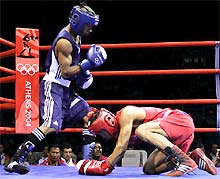With nine of their boxers still in the tournament before Tuesday's action and five already certain to win a medal, Cuba are still on course to top the four golds they won from the last two Games.
That tally was a disappointment by their own standards and the opposition had started holding out hope that their supremacy was on the wane.
"I don't think the Cubans are as dominant as they used to be," American coach Basheer Abdullah said before the Games started.
He was wrong.
With the crucial bouts approaching, Cuba are still the team to beat while the Americans, once the measure of all things in Olympic boxing, have only two boxers left and are at risk of another massive failure.
Cuba have produced some fine professional fighters over the years with such great names as Kid Chocolate and Kid Gavilan but in 1962 everything changed.
That year Fidel Castro outlawed professional sport and the Olympics became the only serious stage for Cuban boxers to show off their skills.
In a bid to reinforce national pride hurt by international sanctions, Castro's communist regime strongly backed sport and boxing became a priority because of the country's unique talent pool.
DANCING FIGHTERS
The most gifted youngsters were picked, nurtured at special schools and results soon followed.
Dancers as much as fighters, the Cuban boxers first made their mark in Olympic boxing with two silver medals in 1968 before winning three golds in 1972.
After staying away from Los Angeles and Seoul, Cuba picked up seven golds in 1992 in Barcelona, the most by any nation in a non-boycotted
"When you're boxing for Cuba, you have to be the best," said welterweight Lorenzo Aragon, putting his finger on one of the reasons for his team's excellence.
"We have to fight just to be on the team," added the veteran of over 400 bouts, who struggled after a quarter-final exit in 1996 in Atlanta and failed to make the Sydney Games.
 Ideology also plays a part in the Cubans' training and the desire to promote their country is often cited as a motivation by their boxers.
Ideology also plays a part in the Cubans' training and the desire to promote their country is often cited as a motivation by their boxers.
"What do I need five million dollars when I have the love of 11 million Cubans?" great heavyweight Teofilo Stevenson once said to explain why he had declined a lucrative offer to fight Muhammad Ali.
Still today, Cuban boxers who have honed their skills by beating truck tyres with rudimentary metal bars at a spartan gym on the outskirts of Havana have a point to prove when they step into the ring.
"I always give it everything I have," said light-welterweight Yudel Johnson, summing up the mentality of Cuban boxers. "That is my promise, and the promise of the team, to the Cuban people."







